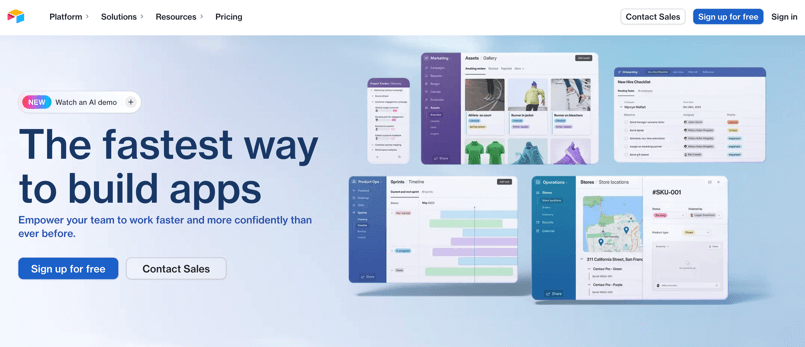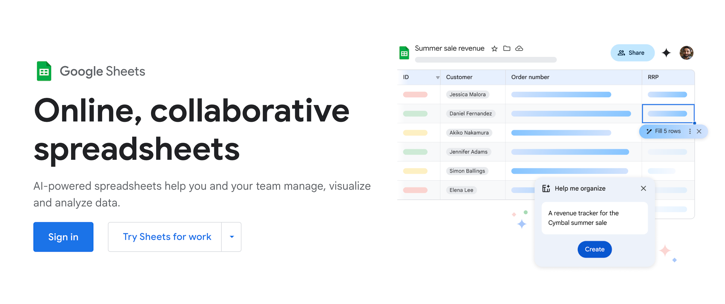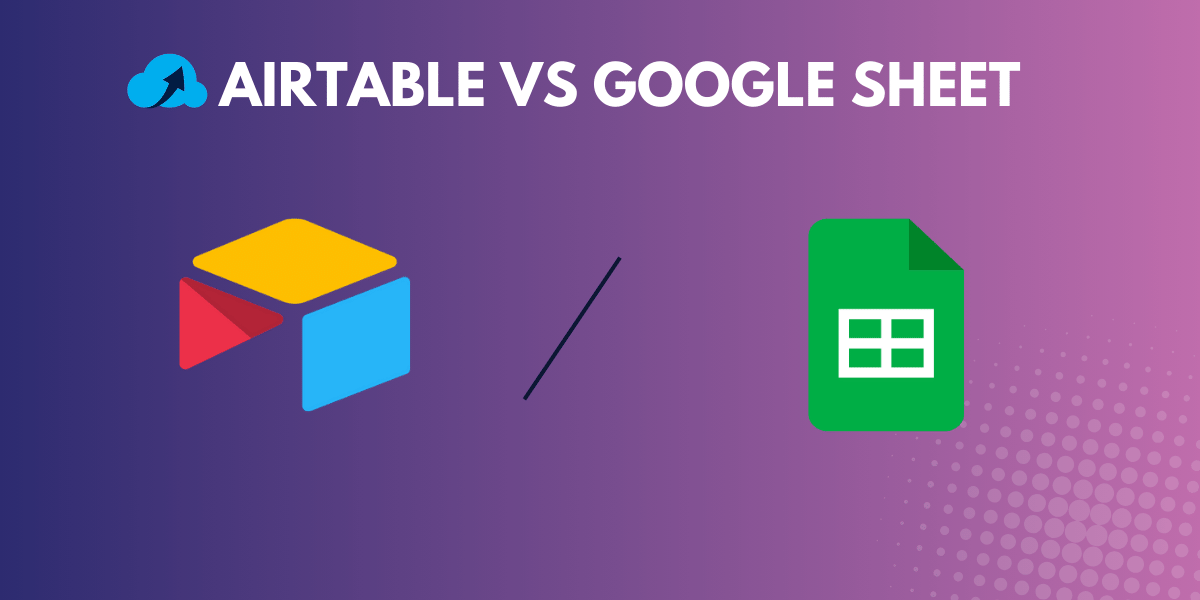Two tools are often considered when managing projects and organizing data: Airtable and Google Sheets. Both are powerful in their own right but serve different purposes and cater to varying needs.
This article deeply compares Airtable and Google Sheets, highlighting their features, pricing, project management capabilities, and more. By the end, you’ll have a clearer understanding of which tool is best suited for your specific needs.
What is Airtable?

Airtable is a cloud-based collaboration and data management tool that combines the simplicity of a spreadsheet with the power of a database. Founded in 2012, Airtable has quickly grown in popularity due to its versatility and user-friendly interface.
Airtable includes customizable views, integrations with a wide range of apps, and robust collaboration tools.
Key Features of Airtable:
- Customizable templates and views (grid, calendar, Kanban, gallery)
- Integration with over 1000 apps including Slack, Google Drive, and more
- Automation capabilities to streamline workflows
- Real-time collaboration and sharing options
Use Cases:
Airtable is used across various industries for project management, content planning, CRM, and more. For instance, a marketing team might use Airtable to track campaign progress, manage content calendars, and collaborate on creative projects seamlessly.
What is Google Sheets?

Google Sheets, part of Google Workspace, is a web-based spreadsheet application known for its ease of use and collaboration features. Launched in 2006, Google Sheets has become a staple for individuals and businesses looking for a straightforward, accessible tool for data management and analysis.
Key Features of Google Sheets:
- Real-time collaboration with multiple users
- Seamless integration with other Google services (Docs, Drive, Calendar)
- Extensive functions and formulas for data analysis
- Add-ons and scripts for extended functionality
Use Cases:
Google Sheets is widely used for data analysis, budget planning, and simple project management. Financial analysts, for example, might use Google Sheets to create detailed budget plans and track expenses.
Comparison of Features
Ease of Use:
- Airtable: Known for its intuitive and visually appealing interface, Airtable offers a smooth user experience. However, there can be a learning curve for users new to database concepts.
- Google Sheets: Familiar to anyone who has used Excel, Google Sheets offers a straightforward and familiar interface. Its simplicity makes it easy for new users to get started quickly.
Data Management:
- Airtable: Acts as a powerful database, allowing for complex data relationships, filtering, and sorting. Ideal for users who need more than just a spreadsheet.
- Google Sheets: Excellent for straightforward data entry and manipulation. While it can handle large datasets, it lacks the advanced database functionalities of Airtable.
Collaboration:
- Airtable: Provides real-time collaboration with detailed permission settings. Users can comment, assign tasks, and share views easily.
- Google Sheets: Also supports real-time collaboration with robust sharing options. Integrated with Google’s suite of apps, it offers seamless communication and file sharing.
Integrations:
- Airtable: Supports over 1000 integrations, making it highly versatile. Whether you need to integrate with Slack, Dropbox, or even complex automation tools like Zapier, Airtable has you covered.
- Google Sheets: Integrates well with other Google services and supports numerous add-ons. However, it’s not as extensive in third-party app integrations compared to Airtable.
Customization:
- Airtable: Offers extensive customization options with various templates, views, and blocks. Users can create custom workflows tailored to their needs.
- Google Sheets: Limited customization compared to Airtable. Users can use templates and scripts, but creating complex custom solutions requires more effort.
Mobile Access:
- Airtable: The mobile app is robust, allowing users to access and edit their databases on the go with a seamless experience.
- Google Sheets: The mobile app is equally effective, providing a user-friendly experience for viewing and editing spreadsheets from anywhere.
Comparison of Pricing
Airtable Pricing Plans:
- Free Plan: Basic features with limited records per base.
- Team Plan: $12 per user/month (billed annually) with more records and additional features.
- Business Plan: $45 per user/month (billed annually) with advanced features and higher limits.
- Enterprise Plan: Custom pricing for large organizations with advanced security and admin features.
Google Sheets Pricing:
- Free with a Google account.
- Google Workspace Business Starter: $6 per user/month (one-year commitment), including additional storage and collaboration tools.
- Google Workspace Business Standard: $12 per user per month (yearly commitment), more security control.
- Google Workspace Business Plus: $18 per user/month (yearly commitment) with enhanced security and management features.
Cost-Effectiveness:
For small businesses or individuals, Google Sheets offers a highly cost-effective solution. For larger teams or businesses needing advanced features and integrations, Airtable’s pricing might be justified by the added functionality.
Project Management Capabilities
Airtable’s Project Management Features:
- Supports multiple views (kanban, Gantt charts, calendar)
- Customizable workflows and automation
- Ideal for teams needing detailed task management and tracking
Google Sheets’ Project Management Capabilities:
- Custom templates for project tracking
- Manual setup required for advanced project management
- Suitable for simpler project management needs
Competitors and Alternatives
Airtable Competitors:
- Notion: Versatile tool for note-taking and project management.
- Asana: Focused on task management with advanced project tracking.
- Trello: Simple and visual task management tool.
Google Sheets Competitors:
- Microsoft Excel: The industry standard for spreadsheets with advanced features.
- Smartsheet: Combines spreadsheet functionality with project management tools.
When to Choose Airtable:
- Need for advanced database functionalities
- Complex project management and customization
- Integration with various third-party apps
When to Choose Google Sheets:
- Simplicity and ease of use
- Tight integration with Google’s ecosystem
- Cost-effective for basic data management
Strengths and Weaknesses
Airtable Strengths:
- Advanced database functionalities
- Customizable workflows and views
- Extensive integrations
Airtable Weaknesses:
- Higher pricing
- The learning curve for advanced features
Google Sheets Strengths:
- Familiar interface and ease of use
- Integration with Google services
- Free for basic use
Google Sheets Weaknesses:
- Limited database capabilities
- Less customization
Statistics and User Feedback
Market Adoption and Popularity:
- Airtable has seen rapid adoption, particularly in creative industries and tech startups.
- Google Sheets remains a staple in many organizations due to its accessibility and integration with Google Workspace.
User Feedback:
- Airtable users praise its versatility and advanced features but note the higher cost and learning curve.
- Google Sheets users appreciate its simplicity and integration but wish for more advanced database features.
Conclusion
Choosing between Airtable and Google Sheets depends on your specific needs and use cases. Airtable offers advanced functionalities and extensive integrations, making it ideal for complex project management and data organization.
On the other hand, Google Sheets provides a familiar and cost-effective solution for simpler tasks and basic collaboration. Assess your requirements carefully to determine which tool will best support your workflow and objectives.
Related Posts:

